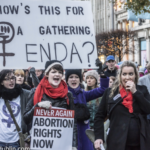Women's Right to Abortion Around the Globe
 Norma McCorvey, Jane Roe of landmark case Roe v. Wade, passed away on February 18 at the age of 69. The 1973 case legalized abortion throughout the United States, resulting in contentious political clashes that remain volatile in the present day. Unsurprisingly, similar debates have taken place in every country around the world. The abortion laws of Ireland, China, and El Salvador provide a glimpse into the varied levels of bodily autonomy available to women across the globe.
Norma McCorvey, Jane Roe of landmark case Roe v. Wade, passed away on February 18 at the age of 69. The 1973 case legalized abortion throughout the United States, resulting in contentious political clashes that remain volatile in the present day. Unsurprisingly, similar debates have taken place in every country around the world. The abortion laws of Ireland, China, and El Salvador provide a glimpse into the varied levels of bodily autonomy available to women across the globe.
China has arguably the most permissive abortion laws in the world. The government places no restrictions on the practice, outside of barring abortions beyond the sixth month of pregnancy and sex-selective abortions. In fact, China has gone as far as to provide paid sick-leave for women who have received abortions. This permissive policy results from the government’s view that abortion acts as a tool for population control. However, one cannot assume that this implies considerable bodily autonomy for women. Chinese authorities have often forced women to undergo sterilization or abortions when they were set to violate the now-repealed one-child policy, which included at least one case of an abortion at the eighth month of pregnancy.
This contrasts considerably with Ireland. It may surprise many Americans to learn that European countries, often seen as bastions of liberal social-democracy, can have far more restrictive abortion laws than those found in the United States. In the case of Ireland, a 1983 referendum enshrined severe abortion restrictions into law as the Eighth Amendment to the Irish Constitution. The country only allows abortion in the case of threat to the mother’s life, including a risk of suicide, as a result of a Supreme Court case in 1992. The law has received condemnation from the UN, which has called it a violation of human rights, though the policy receives support from Roman Catholic institutions in the country. The law has resulted in highly-publicized cases, including the death of an Indian woman who could not legally receive a potentially life-saving abortion. Women can get around the law by travelling outside of the country, a practice protected by the constitution as a result of the 1992 referendum. But without another referendum to overturn the Eighth Amendment, the heavy restrictions placed on the rights of Irish women persist.
Yet, one country has the ignominy of surpassing Ireland in abortion restrictions: El Salvador. Countries in Central and South America have some of the most restrictive abortion laws in the world, with over 97 percent of women in the region living in countries with notable abortion restrictions or total bans, a result of the region’s Roman Catholic heritage. El Salvador fits this trend. The Salvadoran government has placed a total ban on abortions in the country, with no exceptions made even for physical risk to the mother. The government also prosecutes women who experience miscarriages or stillbirths; one woman who suffered a miscarriage faced charges of aggravated murder and 40 years in prison. Women who receive abortions face sentences of two to eight years in prison, while doctors who assist with abortions face up to twelve years in prison. As in the case of Ireland, the nature of El Salvador’s abortion law has earned the ire of the United Nations, with UN human rights officials declaring its policy a violation of international human rights. The debate around abortion in the country has continued, with two radically different paths developing. One path, highlighted by a bill introduced in 2016, will result in the decriminalization of abortion in certain instances, such as rape. The second, highlighted by a separate bill introduced in 2016, will harden the government’s position on abortion, increasing the penalty for illegal abortions to that of aggravated murder with cruelty— worth 30 to 50 years in prison. The congress in El Salvador has yet to pass either law, and the direction the country will take is unknown.
These three countries provide only a sample of the myriad abortion laws in place throughout the world. Passions and differences in personal and communal moral codes entrench attitudes towards the practice. Even Norma McCorvey espoused a pro-life position after becoming a born-again Christian in the 1990s. Yet, one must keep in mind certain realities. As noted above, the UN considers access to safe and legal abortion a matter of human rights. Along with other reasons, this conclusion results from the fact that access to such services provides a notable and positive health benefit. Barriers to abortion access harm the health of women, as does forcing women to carry unwanted pregnancies to term. Both proponents and opponents of a woman’s right to choose have to navigate the moral and ethical realities around the practice.
